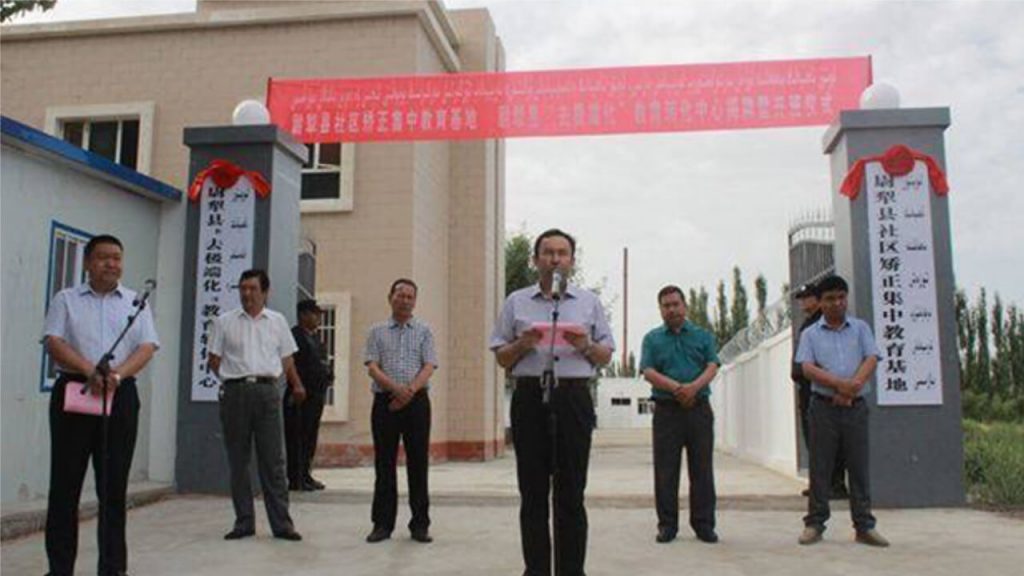An official Chinese Communist Party recording recently obtained by RFA’s Uyghur Service characterizes Uyghurs who have been sent for political “re-education” as “infected by an ideological illness”—not unlike a disease that must be treated at a hospital. The 12-minute Uyghur language audio recording issued in October 2017 offers a rare glimpse into Beijing’s justification for its network of political “re-education camps” used since April 2017 to jail or detain Uyghurs accused of harboring “strong religious views” and “politically incorrect” ideas in the Xinjiang Uyghur Autonomous Region (XUAR). The XUAR’s Party Youth League recording, entitled ‘What Kind of Place is the Educational Transformation Center,’ was published Oct. 11, 2017 on the WeChat social media network by Talap/Tagdim [Request/Offer] Salon and addressed to Uyghur youth as part of a bid to assuage concerns over the camps, which credible reports suggest have held upwards of 1.1 million people, or 10-11 percent of the adult Muslim population of the XUAR. Aside from a brief mention in a recent article carried by state media, China’s central government authorities have not publicly acknowledged the existence of the camps, and the number of inmates kept in each facility remains a closely guarded secret. The following are excerpts from the recording:
In recent times, amid a growing heavy crackdown, a small number of people—particularly young people—have gone to re-education camps to study. However, their parents, friends and relatives, and the general public don’t understand the benefits of re-education, and as a result they are worried and fearful. So let us give answers to their questions and their concerns today.

Photo courtesy of the Korla city government website.
Members of the public who have been chosen for re-education have been infected by an ideological illness. They have been infected with religious extremism and violent terrorist ideology, and therefore they must seek treatment from a hospital as an inpatient. In recent years, there have been violent incidents occurring in Xinjiang, one after another, instigated by the “three evil forces [of “terrorism,” “religious extremism,” and “separatism”], which has threatened the safety of people from all ethnic communities and caused serious damage and losses. These terrorists have one thing in common: they were infected by religious extremism and a violent terrorism disease.
The religious extremist ideology is a type of poisonous medicine which confuses the mind of the people. Once they are poisoned by it, some turn into extremists who no longer value even their own lives … If we do not eradicate religious extremism at its roots, the violent terrorist incidents will grow and spread all over like an incurable malignant tumor.
Although a certain number of people who have been indoctrinated with extremist ideology have not committed any crimes, they are already infected by the disease. There is always a risk that the illness will manifest itself at any moment, which would cause serious harm to the public. That is why they must be admitted to a re-education hospital in time to treat and cleanse the virus from their brain and restore their normal mind. We must be clear that going into a re-education hospital for treatment is not a way of forcibly arresting people and locking them up for punishment, it is an act that is part of a comprehensive rescue mission to save them.
In order to provide treatment to people who are infected with ideological illnesses and to ensure the effectiveness of the treatment, the Autonomous Regional Party Committee decided to set up re-education camps in all regions, organizing special staff to teach state and provincial laws, regulations, the party’s ethnic and religious policies, and various other guidelines. They mobilized the public to learn the common language [Mandarin Chinese], complete various technical training courses, and take part in cultural and sport activities, teaching them what is correct and incorrect … so they can clearly distinguish right from wrong … At the end of re-education, the infected members of the public return to a healthy ideological state of mind, which guarantees them the ability to live a beautiful happy life with their families.
‘Same as physical illnesses’
Ideological illnesses are the same as physical illnesses, in that they must be treated in time, and should never be ignored and allowed to become serious. Otherwise, later we will regret it, as it will be too late … Being infected by religious extremism and violent terrorist ideology and not seeking treatment is like being infected by a disease that has not been treated in time, or like taking toxic drugs … There is no guarantee that it will not trigger and affect you in the future. If people don’t attend re-education class because there is no one to take responsibility for the household chores, or if they choose to run away from re-education, that can be considered being very irresponsible to themselves, their families and society.
Families of those who have been taken for re-education may have concerns over whether they will be charged for re-education classes, provided with food, or if they will be uncomfortable during periods of cold weather, or punished. All these worries are unnecessary … If the trainees fail to achieve the desired results, they will continue classes free of charge until they are qualified and fit to leave … Citizens, please remain calm and relax, no one in the re-education camps will starve, be left in the cold, be punished, or be forced to work. On the contrary, they are given a rare, free chance of re-education in order to reform themselves.
Some people worry that once they have been through the re-education process, they will be classified as bad people, and that even after having worked hard to complete the re-education program they will be discriminated against and treated differently. In fact, this is an unnecessary concern. Just like people who have had an operation, and have taken medication before recovering from their illnesses, the public won’t see them as someone who is ill.
However, we must be cautious about one fact: having gone through re-education and recovered from the ideological disease doesn’t mean that one is permanently cured. We can only say that they are physically healthy, and there is no sign that the disease may return. After recovering from an illness, if one doesn’t exercise to strengthen the body and the immune system against disease, it could return worse than before. So, after completing the re-education process in the hospital and returning home … they must remain vigilant, empower themselves with the correct knowledge, strengthen their ideological studies, and actively attend various public activities to bolster their immune system against the influence of religious extremism and violent terrorism, and safeguard themselves from being infected once again, to prevent later regrets.
This has been an explanation of re-education and should alleviate the public’s anxiety. We hope that every youth thoroughly understands the harm of religious extremism and violent terrorism, strengthens their mental immune system against the virus, and returns to the great family of the Chinese nation to lead a healthy and happy life.
Translated by RFA’s Uyghur Service.
Source: Copyright © 1998-2016, RFA. Used with the permission of Radio Free Asia, 2025 M St. NW, Suite 300, Washington DC 20036. https://www.rfa.org.












